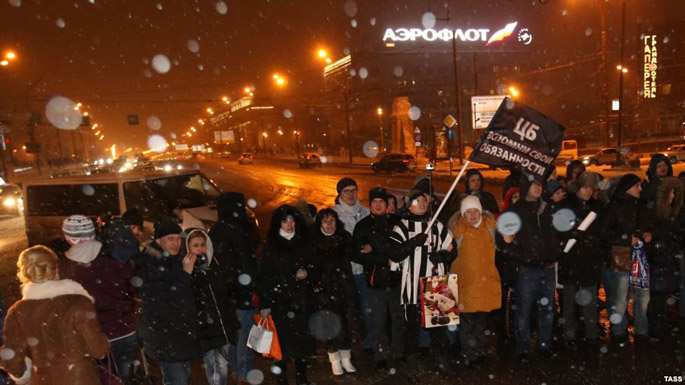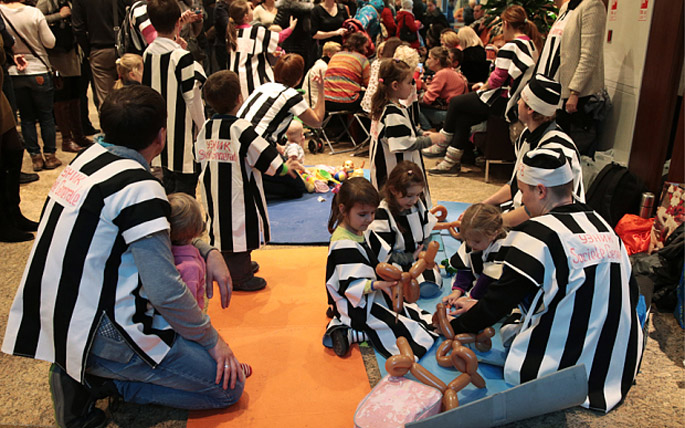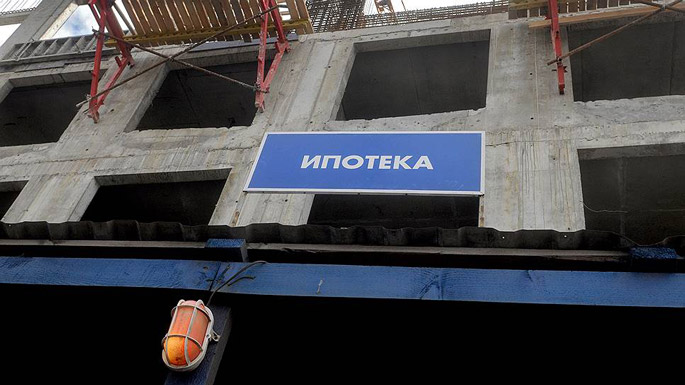A middle-class revolt
Editorial
Foreign-currency mortgage holders have been protesting about the rising cost of their borrowing. But is anybody listening?

The collapse of the rouble is taking its toll. On January 27, foreign-currency mortgage holders at DeltaCredit bank staged a mass rally outside the bank’s Moscow office. Initially, a 300-strong crowd gathered in front of the office, demanding a meeting with the bank’s representatives, and threatening to stop payments on their loans if this demand was not met. As evening fell, the situation grew tense, with the crowd partially blocking off Tverskaya Street. Later, police cleared the roadway of all protesters, two of whom were arrested.
These protests have been going on for more than a week. Over the past seven days, foreign-currency mortgage holders have staged rallies at VTB24, DeltaCredit, and Raiffeisenbank. Understandable, with the mandatory monthly loan repayments costing borrowers ever more due to the dollar’s record growth against the rouble.
January 20 saw a protest by some 100-150 DeltaCredit customers, several of whom handcuffed themselves to doors and chairs while the crowd chanted their demand for a “fair restructuring at the rate recommended by the Central Bank.” The crowd had been hoping for a meeting with the bank’s top managers, but security eventually called the police, and five protesters were detained on charges of hooliganism. The rest submitted written statements detailing their inability to fulfill their obligations to the bank, while 50 mortgage holders ended up sleeping outside its doors.
On the same day, a rally also took place at VTB24. Around 50 mortgage holders gathered outside the bank’s office, demanding to meet with the bank’s management. However, here also, the crowd was denied permission to enter the premises. According to a bank representative, “It [the rally] ended the moment a bank representative came out and took down people’s names and details. Prior to this, the protesters’ attempts to enter the bank triggered our security system and our security personnel barred them from entering the office.”
Two days later, on January 22, foreign-currency mortgage holders held a fresh rally at DeltaCredit Bank. This time, they held solitary pickets outside one of the bank’s offices. But only “rouble” clients who had booked prior appointments were allowed inside.
“The management have all done a runner”
And a few days after that, on January 26, disgruntled borrowers arrived at Raiffeisenbank. About 40 protesters demanded negotiations with the bank’s management; again, the demand was not met. “The management have all done a runner,” said one of the borrowers. “All the employees have run off too. Fortunately, there’s a comparatively small police presence, compared to last time.”
On this occasion, the situation escalated so far that on January 27, Moscow’s main street was blocked off.

“Your request has been forwarded.”
According to Snezhana Yaroshchuk, press-secretary of the All-Russian Movement of Foreign-Currency Mortgage Holders, “Every Saturday, foreign-currency borrowers from all of Russia’s banks arrive at the reception office of the Presidential Administration and file their queries, only to be told that “your request has been forwarded to the Central Bank.” As usual, the Central Bank just comes back with a non-committal reply – solve your issues at your own bank, which is exactly what we’re doing here. And thus we come full circle.”
All these rallies are serving to remind the authorities of the foreign-currency mortgage holders’ demands, which have remained the same for more than a year: they insist that their loans be recalculated to reflect the end-2014 dollar-rouble exchange rate. Almost 100,000 borrowers have been affected by this crisis.
“You only have yourselves to blame”
More often than not, the response people get from the regime is “You only have yourselves to blame.” For instance, Putin’s press secretary Dmitry Peskov summed up the situation like this: “We know that this problem exists. It’s quite well known. Without a doubt, there are people who have fallen into a very difficult situation […] But we shouldn’t forget that this was the choice of people who took certain responsibilities upon themselves.”
President Putin said something very similar during his Direct Line call-in show of April 2015. Asked whether or not a solution would be found to the problem facing foreign-currency mortgage holders, the president replied, “If you’re paid in roubles but take out a mortgage in foreign currency, you’ve taken the exchange-rate risk upon yourself. I don’t know the details, but I’m sure that when people take out mortgages, the bank assumes no responsibility for the exchange-rate risk. That risk is the client’s to bear.”
The mortgage holders’ response is that if the state is incapable of ensuring financial stability in the country, it should pay for its own mistakes. This notion features prominently in a petition to the Russian president, for which signatures are currently being collected.

Same old story
All this isn’t to say, however, that the authorities are completely ignoring the problems faced by foreign-currency mortgage holders. In fact, the Central Bank issued a formal recommendation to banks over a year ago – on January 23, 2015. In it, the regulator takes the side of the borrowers, and advises banks to restructure foreign-currency mortgages, which would also encompass the conversion of loans into roubles. But to date, only Sovcombank has followed this recommendation. Gazprombank had also announced its intention to recalculate loans, only later to deny the existence of such plans.
A programme to assist mortgage holders was also launched in April 2015 by the Agency for Housing Mortgage Lending (AHML). The strategy was that banks would restructure mortgage loans on preferential terms, and that they would be compensated for lost income from public funds (originally no more than 200,000 roubles per person). A total of 4.5 billion roubles was allocated to assist mortgage holders. Ultimately, however, nothing came of this: the requirements for borrowers were too rigid, with only a very limited number of people qualifying. The final version of the amended programme was approved by the government only in early December 2015. The new version softens requirements for borrowers, and triples the reimbursement to banks (up to 600,000 roubles per loan).
The just-mentioned 4.5 billion roubles – due to be released in the spring of last year – has only just now been made available, as announced by Prime Minister Dmitry Medvedev at a recent United Russia forum. Experts are warning, however, that it would be naïve to assume that this assistance will be extended to foreign-currency borrowers. Requirements will be eased only for the socially disadvantaged.
The foreign-currency mortgage holders have called Medvedev’s proposal “complete nonsense.” “You know, the government’s been spouting a lot of words,” lamented a protester. “But it’s given us absolutely no help.”
Of course, rouble and foreign-currency borrowers alike must indeed bear the risks that go with taking out a loan. And yet it ought to be noted that the majority of the latter took out their loans in 2007-2008, when the Russian government was busy assuring the populace that Russia was the only “island of stability” in the ocean of the global crisis. Furthermore, better deals were available on foreign-currency mortgages back then (11% APR in 2007 as compared to 12.8% on rouble mortgages).
One could argue, then, that the foreign-currency borrowers are paying for their misplaced trust in the “tandem” of then-President Dmitry Medvedev and Prime Minister Vladimir Putin.
It was the same story in 2012, when Putin pledged to lower mortgage rates to 6.5% “in the next few years. Provided we can crush inflation,” he said, “I’m convinced that this would be a perfectly realistic goal.”
It wasn’t to be. By the end of 2015, the average mortgage rate in Russia was in the region of 13.5%.



